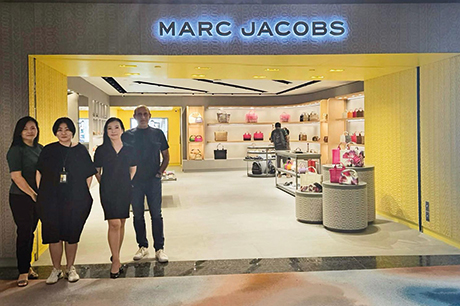ASUTIL: Tackle allowance curbs or lose relevance
By Luke Barras-hill |
 Renewed impetus is required to tackle restrictive duty free allowances at LATAM airport arrivals and border shops, ASUTIL President Gustavo Fagundes declared on day one of the Duty Free & Travel Retail Summit of the Americas.
Renewed impetus is required to tackle restrictive duty free allowances at LATAM airport arrivals and border shops, ASUTIL President Gustavo Fagundes declared on day one of the Duty Free & Travel Retail Summit of the Americas.
Uruguay and Argentina have increased their airport duty free allowances from $500 to $650 and from $300 to $500, respectively, in the past few years, but Brazil is yet to increase its threshold above $500.
“An issue is the enlarging and updating of allowances; we know the majority part of our business is constrained by allowances and if we don’t work on that, we are going to lose relevance,” Fagundes told a packed conference hall.
“The example in Brazil is interesting. In the last 30 years Brazilians have spent four times more in dollars abroad and we as the industry have managed to gather just half of that.”
BRAZIL ALLOWANCE LIFT ‘BY END OF 2019’
Providing his comments to TRBusiness separately on the prospect of an inbound allowance increase, José Luis Donagaray, Secretary General, ASUTIL said: “The allowance increase will come before the end of the year.”
Asked to explain why a decision mooted for a number of years could finally materialise, he pointed towards the catalytic effect of product price increases that has harmed purchasing power.
“With the inflation of dollar, it doesn’t permit you to buy what you had 10 years ago,” he said.
The decision to harmonise regulations for border duty free stores subscribing to the Southern Common Market regional integration union, which took place in December and permits purchases to the value of $300, will also pressure the government to lift the inbound allowance ceiling.
In his address to delegates at the Hyatt Regency in Orlando Florida, Fagundes went on to say transformations and modernisations occurring in the travel retail industry are not being reflected in market-specific customs restrictions.
“Several of the value-added services such as delivery at home are not available to the majority of the industry is because of the regulations.
“Working on the regulations is key for the development of the industry. We have to be able to sell whenever travellers are looking [for products].
“We have to make sure that the partnerships between suppliers, [retail] operators and airport authorities makes us strong and keeps the relevance going. We have much more things in common than things we have to fight against.”
In a presentation revealing the stark impact of the region’s macroeconomic malaise on DF&TR, he revealed how downward pressure from the US dollar on local currencies resulted in significant exchange rate losses last year in Brazil (-17%), Argentina (-101%), Chile (-13%), Colombia (-11%) and Peru (-4%).
“The purchasing power of the main citizens of this region is lowered in dollars,” he stated.
‘GET SMART’, INDUSTRY TOLD
Meanwhile, GDP growth was meagre in Brazil (+1.1%), while Argentina was impacted (-2.6%) by its plunge into recession [although as TRBusiness notes in the March issue, available from the press racks during this week’s event, both countries showed flickers of a growth uptick and this is expected to gain more traction as the year progresses].
Passenger growth on the other hand continues to be healthy in the region, posing a dilemma for operators contending with sinking spend-per-pax levels.
Land border duty free in Uruguay and Argentina – critical touchpoints in the region’s DF&TR tapestry – suffered a 21% decline in 2018 revenue.
Contextualising the market conditions to Dufry’s operations, Fagundes – also Dufry Brazil & Bolivia General Manager – reminded delegates that Latin America revenue declined by 3.5% organic to CHF1.6bn in 2018.
As mentioned, the performance in South America was strongly linked to the devaluation of local currencies, with a ‘spillover’ effect into neighbouring countries.
“More and more it’s not about the volume of passengers but the framework that we are facing,” he said.
He said the climate of mergers and alliances in the aviation sector is resulting in new customer dynamics.
“We really have to understand the environment and profile of the passengers. We need to be smarter.”
PRIVATISATION CONTINUES
Fagundes then turned to the privatisation of Brazil’s airports, with commercial areas benefitting from several improvements and changes to their infrastructure.
Delegates heard how the first round of privatisation resulted in marked improvements in the luxury, duty free, duty paid and convenience offer at airports including São Paulo-Guarulhos International, RIOgaleão – Tom Jobim International, Brasilia, Campinas and Belo Horizonte.
Privatisation has continued apace, with the second round in March 2017 resulting in Fraport and Vinci Airports taking over operations at four airports (Porte Alegre, Fortaleza, Salvador and Florianópolis).
Another round took place earlier this month at 12 airports in Brazil, with AENA securing lots in the northeast, Zürich in the southeast and a Brazilian consortium in the midwest.
A further round of privatisation is slated to begin between 2020 and 2022, including at the country’s main domestic airports.
In a timely recent move, citizens from the US, Canada, Australia and Japan are now able to visit Brazil visa-free for up to 90 days from the point of entry.
Visitors can request to extend their stay to 180 days within a 12-month period.
Turning to the imminent opening of the first Brazilian land border duty free shops, Fagundes did not deliver the ‘big news’ concerning the exact locations of the first shops TRBusiness was hoping, although he did indicate these are more likely to border with Argentina, Uruguay and Paraguay.
The first stores are not anticipated to open before the end of the month, ASUTIL had told TRBusiness previously. Likely locations include densely populated areas such as Foz do Iguaçu, Uruguaiana and Livramento.
Last year, the industry learned legislation had finally been approved to establish shops following a lengthy process dating back to 2012 when the law permitting them to open was originally granted.
The update however certainly narrows down the area for the openings applicable under the law, which permits stores to trade in any of the 32 twin cities that border variously with Uruguay, Paraguay, Bolivia, Peru, Argentina, Colombia, French Guiana, Venezuela and Bolivia.
“I believe in the first semester of this year we will see stores on the Brazilian borders,” said Fagundes.
Customs will extend until 31 July the existing $300 allowance for Brazilians who buy duty free products outside the country, while Brazilians and visitors on Brazil’s border side will benefit from a monthly limit of $300 per person.
“The capability of transforming the border shops opportunity into a real business case depends on how the key stakeholders are going to behave in the early stages,” notes ASUTIL.
E-COMMERCE ‘KEEPS MOTTA AWAKE’
Concluding, Fagundes stressed the importance of travel retail as a driver of economic and social development in the region, stimulating infrastructure development, employment opportunities and border region consolidation.
ASUTIL’s recent move to challenge exclusions of certain duty free product categories under the Mercosur resolution will also remain an important target to ensure no restrictions are placed on sales.
“We keep resilient, investments are coming and we are bringing new airport operators, retailers and suppliers,” he said. “The key here is really to keep modernising and the relevance to travellers.”
Fagundes finished his address by paying tribute to the late Samuel Kauffmann, Co-founder of ASUTIL and a former Brasif executive.
In the prior session, Motta Internacional CEO and IAADFS Chairman Erasmo Orillac spoke at length about the e-commerce opportunity, something he admits ‘keeps him awake’ at night.
He pointed to a 24% increase in online buyers from 126m in 2016 to 156m across the region as of February 2019.
Sales are expected to rise to $80bn by the end of this year – a doubling of the $40bn recorded in 2016 – spurred on by younger generational buyers, millennials and digital natives.
Relating the trend to the Motta business, Orillac says 45% of the company’s website traffic is from those aged 25 years and under, but most purchases come from those aged 35 years and older.
Attenza Duty Free’s website only generates 0.5% of the retailer’s revenue, however, it is a profitable marketing tool that makes enough money to sustain itself.

A leading lineup of retail and supplier panellists debate travel retail’s future in an uncertain climate in a session moderated by The Moodie Davitt Report Founder & Chairman Martin Moodie.
Notwithstanding this, at least 60% of online visitors have the attention to buy.
“Online is becoming more and more of a stepping stone in the purchasing journey,” he added.
PLOTTING A POSITIVE TR FUTURE
A panel session moderated by The Moodie Davitt Report’s Martin Moodie completed the opening day’s conference. The session focused on the theme, ‘Plotting a Positive Travel Retail Future in an Uncertain World’.
The panellists were Yannick Raynaud, Managing Director Duty Free & Travel Retail Americas, L’Oreal; Marshall Farrer, Senior Vice President and Managing Director; Brown-Forman Beverages Worldwide; Mariana Stangl, Worldwide Duty Free Corporate Affairs and Communications Manager, JT International; and René Riedi, Divisional CEO Latin America & Caribbean, Dufry.
Things kicked off with a series of short assessments on the panellists’ respective businesses. All touched on the challenging currency headwinds affecting Latin America, nonetheless, a more upbeat outlook for global travel retail this year persists this year.
Raynaud was positively optimistic, Brown-Forman’s Farrer says there have been some headwinds, last year was slower, but business is picking up.
Riedi said that globally the picture is different compared to the regions. So far in 2019, there has not been much change and the business has not picked up dramatically, he confirmed. Stabilisation on a lower level, ‘is a scenario we will have to live with’, he admitted.
He said there remains a need to work hard in maintaining a positive price perception for travel retail.
He says when the privatisation of airports occurs, prices often become more expensive.
Conversation then turned to the biggest challenges and opportunities for businesses in the Americas region.
Raynaud acknowledged that passenger numbers are up, but spending is down, with in-store penetration presenting a significant opportunity. Using the example of Chinese travellers, while traffic is healthy, conversion is not as dynamic as it could be.
“Penetration is the big elephant in the room and one of our priorities,” she told the audience.
Stangl touched on tobacco shopping’s big opportunity and its role as a fundamental cross-category purchase driver.
Pre-planned purchases are important in this vein, but tobacco buyers make up an average basket spend of around $187 versus around $124 for baskets that do not include the category.
On the growing popularity in reduced-risk products, she acknowledges an increase in interest, but stresses that JTi believes reduced-risk products will co-exist alongside conventional tobacco products for some time.
“Overall we believe in an informed decision by the consumer and we are providing the choice for them,” she responded.
Brown-Forman’s Farrer said: “I think the potential way forward is capturing this wave of ecommerce in travel retail. We are seeing Brazil and Mexico as the two highest growth drivers in our company.”
He hopes for a bit more acceleration than last year to support the health of travel retail.
Riedi flagged Dufry’s digital transformation as an important opportunity, alongside investment in diversified travel retail channels such as cruise lines and border shops.

Yannick Raynaud, MD, L’Oréal Travel Retail Americas (fifth left) and Marshall B. Farrer, SVP & MD Brown-Forman GTR (fourth left) cut the ribbon to inaugurate the Duty Free & Travel Retail Summit of the Americas trade show.
Collaboration between Dufry and its vendors to foster a pipeline of new products remains essential, he stated.
The panellists agreed that closer synergies and integration in travel retail through strong ties in the domestic market can drive growth.
BIG BOX RETAIL WARNING
Asked for their hopes, aspirations and fears, Raynaud hopes for a rebound and says the company has a duty to respond in difficult market conditions by offering consumers something that delivers more relevance.
Drawing a parallel with devaluations in Russian and Turkish currencies compared to South America, Farrer says the company takes a long-term view on the issue.
He said while the situations sorts itself out it is in the meantime recruiting ‘legions’ of new consumers entering travel retail.
Asked by moderator Martin Moodie to gaze into the ‘crystal ball’ of the future, Riedi it is a ‘mixed bag’ when it comes to South America with high expectations for Brazil as the new political administration takes hold,
Argentina meanwhile is gripped by preparations for its forthcoming election and the complex economic situation will mean a high level of currency volatility.
Turning to the Caribbean, Raynaud points to rising appeal in the cruise business.
“It is a region that stands out quite positively now with the continued, strong growth of the cruise industry. It seems to be very well suited to the type of vacation travellers want to take today with new experiences in an easy format.”
Addressing the North American business, Riedi acknowledged that the domestic travel trend is geared towards food and convenience options, with Dufry’s stores performing well in recent years.
“On the other side we have duty free, which has performed very well too but we are seeing some clouds in the sky with the Chinese.”
Asked to elaborate, he pointed towards government efforts at halting corruption, which changes Chinese consumers’ behaviours when travelling to the US and other parts of the world.
Farrer then identified the aggressiveness of ‘big box retailers’ in the Americas.
“It is not just a price play – they have significantly advanced their game in terms of what they are offering at point of purchase, the variety that is on sale, the knowledge of the staff, the shopper experience, their foray into the digital ecommerce space and click and collect.”
The panel concluded with a discussion on this future digital landscape, it’s opportunities and threats.
MEADFA Conference 2024 ‘heading to Abu Dhabi on 17-19 November’
This year’s Middle East & Africa Duty Free Association (MEADFA) Conference will take...
DFWC Q1 2024 KPI Monitor indicates rise in duty free impulse purchases
Impulse purchasing within global duty free is on the rise, according to the latest Duty Free...
Avolta details “bold and ambitious” goals to grow its APAC business
With a number of key developments coming to fruition, including its operations at Wuhan Tianhe...

In the Magazine
TRBusiness Magazine is free to access. Read the latest issue now.

 Trbusiness. The travel retail Trbusiness. The magazine for global retail and duty free professionals.
Trbusiness. The travel retail Trbusiness. The magazine for global retail and duty free professionals.























